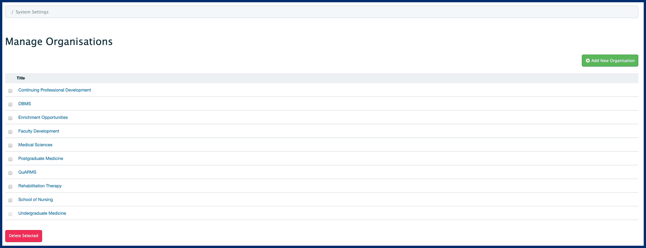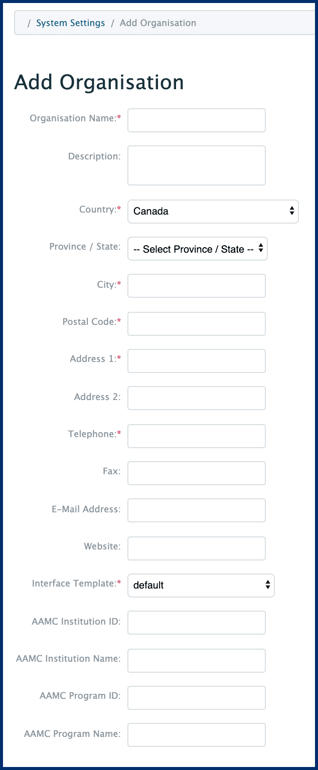Organizations & Multi-Org Instances of Elentra
Article Content
This article covers the following topics. Click on the topic to go to that section of the article.
Introduction to Organizations
In Elentra, "organization" refers to an entity using and managing its own curriculum map version, layouts, tags, courses/programs, learning events, gradebooks, etc. An organization is the highest level of an overarching 'container' within Elentra, of which all of the System Settings are configured and customized within. Examples of organizations include undergraduate MD or DO programs, graduate medical programs, Physician's Assistant (PA) programs, Chiropractic programs, Veterinary Medicine, and other health profession degrees/certificates.
Many organizations can be created within your instance of Elentra, and the System Settings will remain specific and only applicable to each individual organization. An organization is the first thing that must be created when starting to build your instance of Elentra.
Multi-Org Environments
Elentra is designed to facilitate many programs within a single environment of Elentra, segregated into distinct organizations. User access and permissions are defined on a per-organization basis.
Tip: When choosing what your Elentra domain will be, consider using your institutional name instead of the specific school or degree you are implementing. IE:
- institution-name.elentra.cloud; not
- schoolofmedicine.elentra.cloud
If you choose to implement other programs into Elentra at a later date, a new or changed domain will incur additional costs.
Data Segregation
Most Elentra settings and data are contained within an organization, and cannot be accessed by users who not permissioned to that organization. There are two exceptions:
- Users
- Communities
For institutions with multiple organizations, staging refreshes should be considered carefully, as this cannot be segregated by organization.
Users
Users are one of the areas of Elentra that does not segregate information, meaning that Manage Users will display users from all orgs. Users can be permissioned to multiple organizations and can have different roles within them. For example:
- A faculty member may be a Faculty:Director user in the undergraduate MD organization, and a Faculty:Lecturer user in the Family Medicine Graduate Program organization.
- IT personnel can be Medtech:Admin or Staff:Admin users in all orgs that they are tasked with governing.
- A resident may be a Student:Student user in a graduate program organization and a Faculty:Lecturer user in an undergraduate organization.
Communities
In Elentra, communities are commonly used for things such as staff and faculty training information, institutional resource hubs, institutionally-based clubs, student and faculty unions, and other uses that supercede an organization in Elentra. Communities in Elentra that are not tied to a course (ie, not a course website type community) are accessible to community members, regardless of which organization(s) the user is permissioned to. Users with access to multiple organizations will be able to access their communities of interest from whichever organization they are currently in, and do not need to switch to a particular organization to access that community.
Reporting
Elentra has two reporting platforms:
- Elentra Legacy Reports
- Elentra Analytics
Generally speaking, legacy reports are organization-specific. A user logged into a particular organization who can generate reports can navigate to the module's reports they want to generate, and only data from the current organization will be returned.
In Elentra Analytics, reports can be designed to include an Organization filter. Data can be reported on in a per-organization basis, or aggregated from multiple organizations, as desired.
Create and Edit Organizations
To add an Organization, follow the below steps:
- Navigate to Admin > System Settings.
- Click Add New Organisation.
Warning: Implementation support for any new organizations requires a contractual agreement. To implement a new program within your existing Elentra instance, contact Elentra Support.

- Provide the required information; required fields are defined by a red asterisk.
- Interface Template: Default will be the only option available.
- Optional AAMC fields: Required if you plan to use Elentra's Curriculum Inventory Report. If you are unsure of your AAMC Institution ID, contact ci@aamc.org.
- Click Save.

Permissioning Users to Organizations
Users can be added to additional organizations via user profile permissions.

When editing the user profile from Manage Users, select the desired organization, group, and role as desired, and click 'Add Permission'. Save the profile to apply the changes.
Switching Between Organizations
If a user has been assigned more than one set of permissions, they will see a building icon in their Elentra navigation bar.
![]()
Clicking the building icon will display the list of available roles and organizations that have been assigned. Click to switch to that permission set and organization.

